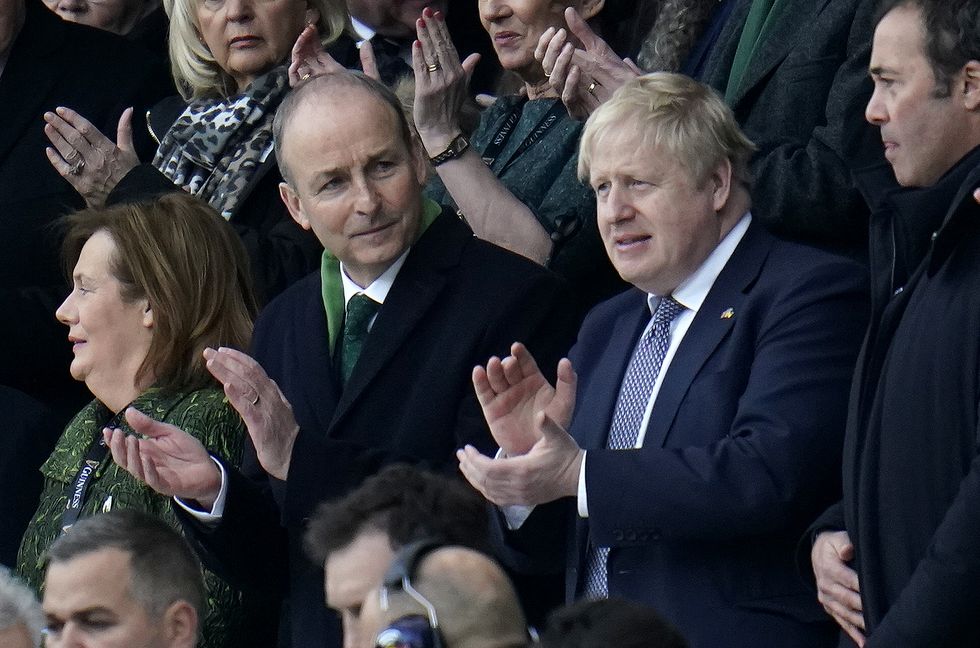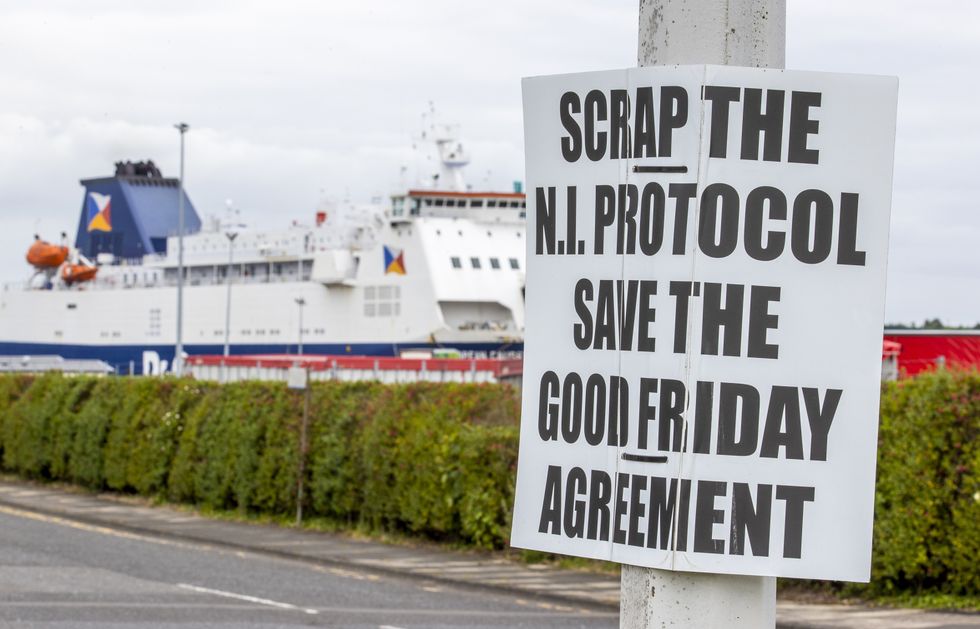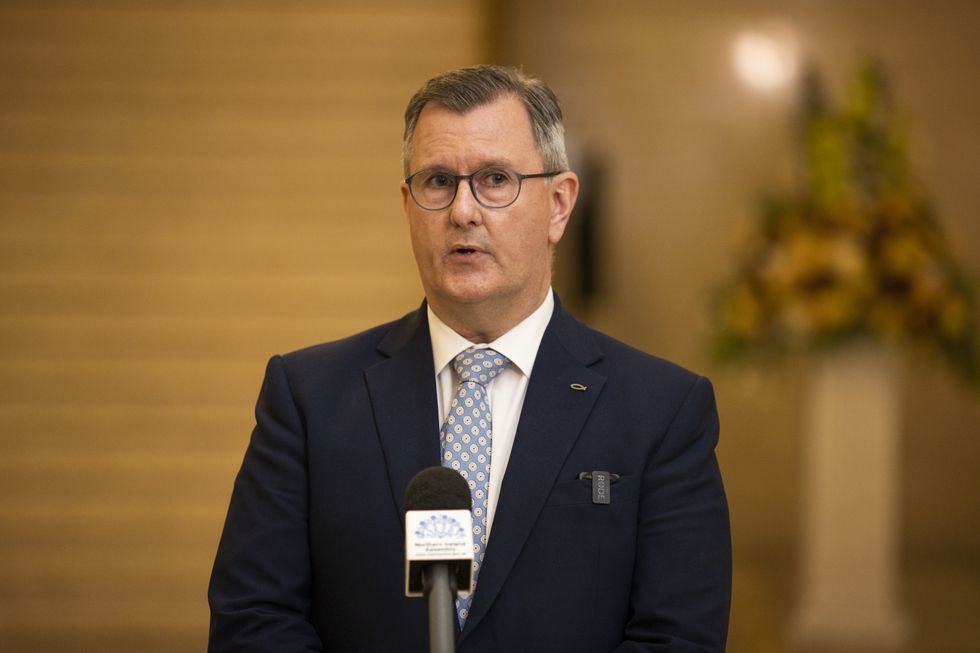Don't Miss
Most Read
Trending on GB News
Boris Johnson has triggered a fresh dispute with the European Union as his Government sets out plans to override the agreement governing Northern Ireland’s post-Brexit trading arrangements.
The Irish government said the measures marked a “new low point” and accused Mr Johnson’s administration of “breaking the law”.
The Prime Minister insisted the Northern Ireland Protocol Bill contained only minor bureaucratic changes, while Downing Street said it was an “insurance mechanism” in case a negotiated agreement with the EU could not be found.
Mr Johnson signed the Northern Ireland Protocol with the European Union as part of the Brexit divorce settlement, with the measures aimed at preventing a hard border on the island of Ireland.
Taoiseach Michael Martin speaks during a reception event at the Kennedy Center in Washington, DC, during his visit to the US for St Patrick's Day.
Oliver Contreras
But by imposing checks on goods crossing the Irish Sea from Great Britain, the Protocol has fuelled unionist anger and is also opposed by eurosceptics in Mr Johnson’s Conservative Party.
The new legislation creates a framework to allow ministers at Westminster to introduce changes in four areas covering customs and agri-food safety checks, regulation, subsidy controls and the role of the European Court of Justice.
The new legislation, as set out on the Government website, seeks to tackle the issues raised by the protocol in four "durable" ways.
Firstly, the plans seek to create "green and red channels to remove unnecessary costs and paperwork for businesses trading within the UK, while ensuring full checks are done for goods entering the EU.
Taoiseach Michael Martin and Prime Minister Boris Johnson in the stands during a Guinness Six Nations match at Twickenham.
Andrew Matthews
It also wishes to ensure businesses "have the choice of placing goods on the market in Northern Ireland according to either UK or EU goods rules, to ensure that Northern Ireland consumers are not prevented from buying UK standard goods, including as UK and EU regulations diverge over time."
The third area of the bill is designed to "ensure Northern Ireland can benefit from the same tax breaks and spending policies as the rest of the UK, including VAT cuts on energy-saving materials and Covid recovery loans."
Finally, the bill intends to "normalise governance arrangements so that disputes are resolved by independent arbitration and not by the European Court of Justice."
The UK Government insisted the Bill was compatible with international law under the “doctrine of necessity” which allows obligations in treaties to be set aside under “certain, very exceptional, limited conditions”.
But Ireland’s premier Micheal Martin said “it’s very regrettable for a country like the UK to renege on an international treaty”, adding: “It represents a new low point because the natural expectation of democratic countries like ourselves, the UK and all across Europe is that we honour international agreements that we enter into.”
An anti-Northern Ireland Protocol sign close to Larne Port, as a Bill to amend the Northern Ireland Protocol unilaterally will be introduced in Parliament today, amid controversy over whether the legislation will break international law.
Liam McBurney
The Protocol is “an international deal ratified by the British Parliament and approved by the PM”, the Taoiseach said, and breaching it “goes to the heart of the issue of trust”.
Foreign Secretary Liz Truss said she was “very clear that we’re acting in line with the law” and blamed the EU for the failure to reach a negotiated settlement.
Responding to Mr Martin’s criticism she said: “We have sought a negotiated settlement for the last 18 months but as yet the EU have been unwilling to change the terms of the Protocol.
“So I would strongly encourage the Irish Taoiseach to discuss this with the EU, to get a change in the mandate, and then we can go to the negotiating table.”
She rejected the suggestion the move was merely a negotiating ploy, telling reporters at the Foreign Office: “We’re completely serious about this legislation.”
The Protocol arrangements require regulatory checks and customs declarations on goods and plant and animal products moving between Great Britain and Northern Ireland, because they could flow through the open border with Ireland into the EU’s single market.
DUP leader Sir Jeffrey Donaldson speaks to the media in the Great Hall at Parliament Buildings, Stormont, Belfast as the Bill to amend the Northern Ireland Protocol is introduced in Parliament amid controversy over whether the legislation will break international law.
Liam McBurney
Unionists are vociferously opposed to the treaty, claiming it has undermined the region’s place within the United Kingdom.
Sir Jeffrey Donaldson said: “The DUP will judge what constitutes decisive action as we see this Bill progressing.”
The DUP leader reiterated his claim that the Irish Government was “tone deaf” to unionist concerns.
He told the administration in Dublin: “Start listening to what unionists are saying, understand the nature of our concerns, take your head out of the sand and recognise that there is a problem here that needs to be resolved, stop running away from the problem – let’s get it sorted.”
He said he did not believe the UK Government was acting illegally.
“I believe that the British Government is acting within the provisions of the Withdrawal Agreement,” he added.
The DUP has blocked the formation of a new power-sharing government at Stormont following last month’s Assembly election in protest at the protocol.
Mr Johnson told LBC Radio: “One community at the moment feels very, very estranged from the way things are operating and very alienated.
“We have just got to fix that. It is relatively simple to do it, it’s a bureaucratic change that needs to be made.
“Frankly, it’s a relatively trivial set of adjustments in the grand scheme of things.”
The Bill will enable ministers to establish a “green lane” so trusted traders are allowed to move goods from Great Britain to Northern Ireland without checks, as long as the products remain within the UK.
Goods supplied by firms outside the trusted trader scheme, or products destined for Ireland and the EU, would go through a red lane and face checks.
Products being placed on the market in Northern Ireland would be allowed to follow either UK or EU regulations, rather than having to comply with Brussels’ rules.
An anti-Northern Ireland Protocol sign close to Larne Port, as a Bill to amend the Northern Ireland Protocol unilaterally will be introduced in Parliament today, amid controversy over whether the legislation will break international law.
Liam McBurney
Changes would also allow Northern Ireland to be included in UK Government state aid schemes and tax changes – for example the UK has complained that VAT relief on energy-saving materials could not be extended across the Irish Sea while changes to the alcohol duty regime are also prevented from applying in Northern Ireland.
The fourth area where changes are envisaged is the governance of the arrangements and the role of the European Court of Justice (ECJ).
The plan would mean that UK courts are responsible for the operation of the new regime, but matters of EU law could still be referred to the ECJ.
The UK also proposes removing the ECJ as a final arbiter in trade disputes over the Protocol, with the function instead handed to independent adjudicators.
The UK Government’s position has been opposed by 52 of the 90 MLAs in the Stormont assembly, with politicians representing Sinn Fein, the SDLP and the Alliance Party condemning the “reckless” plan.
But Ms Truss said the Protocol had “damaged the balance” between nationalist and unionist communities and she was determined to address that.
The Government’s actions could also inflame tensions with Joe Biden’s White House, which takes a keen interest in issues affecting the Good Friday Agreement – the US President is proud of his Irish roots.
Ms Truss said: “I have had regular discussions with the United States on this issue. Of course they are an important ally of the United Kingdom, I know that the US wants to see this situation sorted out and they want to see the Belfast/Good Friday Agreement restored as well.”
European Commission vice president Maros Sefcovic has said the EU views the UK Government’s decision to table legislation overriding elements of the Northern Ireland Protocol with “significant concern”.
Speaking at the Commission headquarters in Brussels, Mr Sefcovic said the unilateral action by the UK could put the access of Northern Ireland businesses to the EU single market at risk.
He said the commission would now look at restarting “infringement proceedings” against the UK which have been on hold since September 2021.
“It is with significant concern that we take note of today’s decision by the UK Government to table legislation disapplying core elements of the protocol. Unilateral action is damaging to mutual trust,” he said.
“In particular, the Protocol provides business operators in Northern Ireland with access to the EU single market for goods. The UK Government’s approach puts this access – and related opportunities – at risk.
“Our aim will always be to secure the implementation of the Protocol. Our reaction to unilateral action by the UK will reflect that aim and will be proportionate.”















